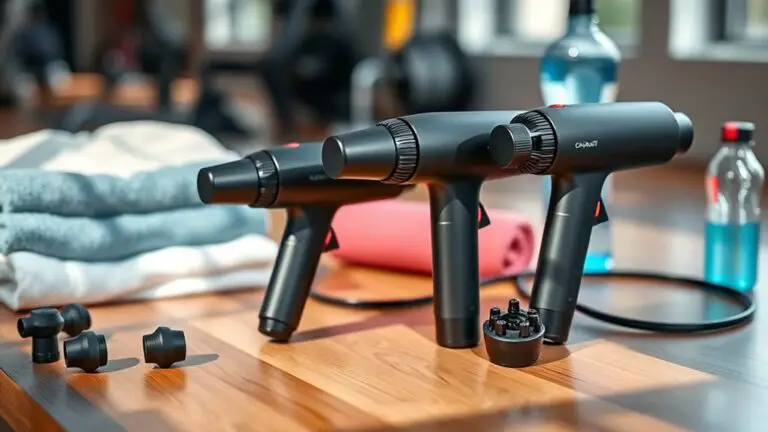How to Improve Sleep Quality for Faster Recovery

Improving your sleep quality is essential for faster recovery. Start by creating a calming environment with soft colors and dim lighting. Stick to a consistent sleep schedule and limit screens an hour before bedtime to prevent melatonin disruption. Incorporate relaxation techniques like deep breathing or progressive relaxation to ease tension. Pay attention to your food and drink choices, avoiding heavy meals and caffeine close to bed. If you’re looking for more tips, there are plenty of strategies to explore further.
Create a Sleep-Inducing Environment

Creating a sleep-inducing environment is essential for achieving restful slumber, especially when you’re looking to recover quickly. Start by considering the colors in your bedroom; soft blues and greens are known as sleep colors because they promote calmness and relaxation. You might also want to dim the lights or use blackout curtains to eliminate any disruptive glare.
In addition to colors, incorporating ambient sounds can greatly enhance your sleep quality. Gentle nature sounds, like rain or ocean waves, can help mask disruptive noises and create a soothing atmosphere. You can use a white noise machine or a sleep app to find the right sound for you.
Lastly, keep your room cool and clutter-free. A tidy space can ease your mind, making it easier to drift off. By creating this tranquil environment, you’re setting the stage for restorative sleep that aids in quicker recovery.
Establish a Consistent Sleep Schedule
A tranquil sleep environment sets the foundation, but what happens next is just as important: establishing a consistent sleep schedule. Your body thrives on routine, and sticking to regular sleep and wake times can help stabilize your sleep patterns, aligning them with your biological clock. This consistency signals your body when it’s time to wind down and when to wake up, improving overall sleep quality.
| Day | Sleep Time | Wake Time |
|---|---|---|
| Monday | 10:30 PM | 6:30 AM |
| Wednesday | 10:30 PM | 6:30 AM |
| Friday | 10:30 PM | 6:30 AM |
Limit Exposure to Screens Before Bed

As you prepare for a restful night, limiting exposure to screens before bed can greatly enhance your sleep quality. Research shows that excessive screen time, especially in the evening, can interfere with your body’s natural sleep-wake cycle. The blue light emitted by phones, tablets, and computers disrupts melatonin production, making it harder for you to fall asleep.
To improve your sleep, aim to disconnect from screens at least 30 to 60 minutes before bedtime. Use this time to unwind with a book or engage in calming activities that don’t involve electronics. If you must use screens, consider enabling blue light filters or night mode settings, but the best strategy is still to limit overall screen time in the evening. By creating a screen-free environment, you’ll be setting the stage for deeper, more restorative sleep, ultimately aiding your recovery and well-being.
Incorporate Relaxation Techniques
Since relaxation techniques can greatly reduce stress and promote restful sleep, incorporating them into your nightly routine is essential for improving sleep quality. One effective method is deep breathing, which helps calm your mind and body. Try inhaling deeply through your nose, holding for a few seconds, and exhaling slowly through your mouth. Doing this for several minutes can considerably lower anxiety levels.
Another beneficial technique is progressive relaxation. This involves tensing and then relaxing each muscle group in your body, starting from your toes and working your way up to your head. By focusing on the sensations of tension and release, you’ll not only ease physical stress but also quiet your racing thoughts.
Making these techniques a habit can enhance your overall sleep experience, leading to faster recovery and improved well-being. So, set aside a few minutes each night to practice these methods and enjoy the benefits of a more restful night’s sleep.
Be Mindful of Food and Drink Choices

While you may not realize it, the food and drink choices you make can greatly impact your sleep quality. Paying attention to food timing is essential; eating large meals too close to bedtime can disrupt digestion, affecting your ability to fall asleep. Aim for a balanced nutrient intake throughout the day, ensuring you’re not overloading on sugar consumption, which can lead to energy spikes.
Hydration effects also matter—being well-hydrated can improve sleep, but too much liquid before bed may lead to frequent trips to the bathroom. Be mindful of caffeine impact; even afternoon coffee can keep you wired at night. Alcohol influence is another factor; while it may initially help you relax, it often disrupts sleep patterns later on. Finally, consider meal size; lighter meals closer to bedtime can facilitate better digestion and improve sleep quality overall.
Optimize Your Sleep Position
Choosing the right sleep position can greatly enhance your sleep quality and overall recovery. Your body alignment during sleep plays a significant role in how well you rest and recuperate. If you sleep on your back, it can promote natural spinal alignment, reducing pressure on your joints. However, if you snore or have sleep apnea, side sleeping might be a better option, as it keeps your airways open.
If you prefer sleeping on your side, consider using a pillow between your knees to maintain proper hip alignment. This can help alleviate any lower back pain you might experience. Stomach sleeping, while comfortable for some, can strain your neck and spine, making it less ideal for recovery.
Ultimately, experimenting with different sleep positions can help you find the one that best supports your body alignment, leading to improved sleep quality and a quicker recovery process.
Manage Stress and Anxiety Levels

Managing stress and anxiety is essential for improving your sleep quality and speeding up recovery. Techniques like mindfulness and meditation can help calm your mind, while establishing a relaxation routine prepares your body for rest. Additionally, limiting screen time before bed can greatly reduce distractions and promote a more restful night’s sleep.
Mindfulness and Meditation Techniques
As you navigate the challenges of daily life, incorporating mindfulness and meditation techniques can greatly reduce stress and anxiety levels, ultimately enhancing your sleep quality. One effective method is practicing breathing exercises. By focusing on your breath, you can calm your mind and reduce racing thoughts. Try inhaling deeply for four counts, holding for four, and exhaling for four. Additionally, guided imagery can transport you to a peaceful place, helping to ease the tension of the day. Visualize serene landscapes or calming scenarios to anchor your thoughts. Research shows that these techniques can lower cortisol levels, promoting relaxation and better sleep. By making mindfulness a habit, you’ll not only improve your sleep but also your overall well-being.
Establishing a Relaxation Routine
While life can often feel overwhelming, establishing a relaxation routine can be a powerful tool in managing stress and anxiety levels. Incorporating simple practices like breathing exercises can help calm your mind and body. Try inhaling deeply for a count of four, holding for four, and exhaling for four; repeating this several times can greatly reduce tension. Additionally, guided imagery can transport you to a peaceful place, easing worries and fostering tranquility. Picture a serene beach or a quiet forest, focusing on the details of your surroundings. By dedicating just a few minutes each day to these techniques, you’ll create a sense of peace that not only enhances your relaxation routine but also improves your overall sleep quality.
Limiting Screen Time Before Sleep
Although it might be tempting to scroll through your phone or binge-watch your favorite series before bed, limiting screen time can greatly enhance your sleep quality and reduce anxiety. Research shows that exposure to blue light emitted by screens can disrupt your body’s natural sleep-wake cycle, making it harder to fall asleep. By reducing screen time at least an hour before bed, you give your mind a chance to unwind and prepare for rest. Try replacing screens with calming activities like reading or meditation. This not only helps your eyes but also lowers stress levels, allowing for a more peaceful shift into sleep. Prioritizing this practice can lead to better recovery and overall well-being.
Consider Sleep Aids and Supplements

If you’re struggling with sleep, you might consider natural sleep aids and herbal supplements as potential options. Many of these can help improve sleep quality without the side effects of prescription medications, but it’s essential to pay attention to timing and dosage for the best results. Understanding how these aids work can empower you to make informed choices for a more restful night.
Natural Sleep Aids
As you seek better sleep for faster recovery, natural sleep aids can play a significant role in your journey. Incorporating herbal remedies like valerian root or chamomile tea can help calm your mind before bedtime. Additionally, melatonin supplements can support your body’s natural sleep-wake cycle. Don’t overlook the power of essential oils, such as lavender, which can enhance relaxation. Maintaining good sleep hygiene is essential; establish sleep rituals that signal your body it’s time to wind down. Consider improving your magnesium intake, as it’s known to promote restful sleep. By combining these natural aids and practices, you can create a more conducive environment for restorative sleep, ultimately enhancing your recovery process.
Herbal Supplements Benefits
When exploring the benefits of herbal supplements, you’ll find that they can greatly enhance your sleep quality and recovery. Herbal tea, particularly those infused with chamomile extract and valerian root, offers natural calming properties that help you unwind before bed. Valerian root is well-documented for reducing sleep latency, while chamomile extract promotes relaxation. Additionally, passionflower benefits include easing anxiety, leading to a more restful night. Adaptogenic herbs, like ashwagandha, help your body manage stress, further improving sleep quality. Incorporating these herbal remedies into your nightly routine can foster better relaxation and recovery. So, whether you sip on herbal tea or take a supplement, know that nature provides powerful tools to enhance your sleep experience.
Timing and Dosage
Understanding the right timing and dosage for sleep aids and supplements can greatly impact your sleep quality and overall recovery. To align with your natural sleep cycles, it’s best to take supplements about 30 to 60 minutes before bedtime. This allows your body to process them effectively, enhancing their benefits.
When it comes to ideal dosage, it’s essential to start low and gradually increase as needed. Many people find that less is often more; higher doses can disrupt sleep rather than improve it. Always consult with a healthcare professional before starting any new supplement, as individual needs can vary. By carefully managing timing and dosage, you can achieve deeper, more restorative sleep, leading to quicker recovery.
Frequently Asked Questions
How Does Sleep Quality Affect Athletic Performance and Recovery?
Sleep quality greatly impacts your athletic performance and recovery. When you prioritize adequate sleep duration, you give your body the chance to repair itself and replenish energy stores. A conducive sleep environment, free from distractions, enhances deep sleep stages, which are essential for muscle recovery and mental clarity. Poor sleep can lead to decreased focus, slower reaction times, and increased risk of injuries. By improving your sleep, you can elevate your performance and overall well-being.
Are Naps Beneficial for Improving Overall Sleep Quality?
Imagine a cozy afternoon where you take a brief escape into dreamland. Naps can indeed be beneficial for improving overall sleep quality. The ideal nap duration is around 20-30 minutes, avoiding deep sleep that can leave you groggy. Timing matters too; early afternoon naps work best, as they won’t interfere with your nighttime sleep. By integrating short naps into your routine, you can enhance alertness and overall well-being, giving your body the refresh it needs.
What Role Does Exercise Play in Sleep Quality?
Exercise plays a significant role in sleep quality. Engaging in regular physical activity can help you fall asleep faster and enjoy deeper sleep. However, exercise timing is essential; vigorous workouts close to bedtime might disrupt your rest. Instead, moderate intensity earlier in the day often enhances sleep. It’s important to listen to your body—finding the right balance can lead to improved sleep quality and overall well-being.
Can Sleep Deprivation Lead to Long-Term Health Issues?
Imagine your body as a finely-tuned machine; without proper fuel, it starts breaking down. Yes, sleep deprivation can lead to serious long-term health issues like sleep disorders and chronic fatigue. Research shows that insufficient sleep weakens your immune system, increases stress, and can even contribute to cardiovascular problems. It’s essential to prioritize sleep, as neglecting it may feel like running on empty—eventually, you’ll need to stop and refuel to keep moving forward.
How Do Age and Gender Impact Sleep Needs and Quality?
Age and gender greatly impact your sleep needs and patterns. As you age, your sleep requirements may decrease, with older adults often needing less deep sleep. Women might experience different sleep disturbances due to hormonal changes, especially during menstruation or menopause. These factors can lead to variations in sleep quality, making it essential for you to recognize your unique needs. Understanding these differences can help you make informed choices for better rest.





